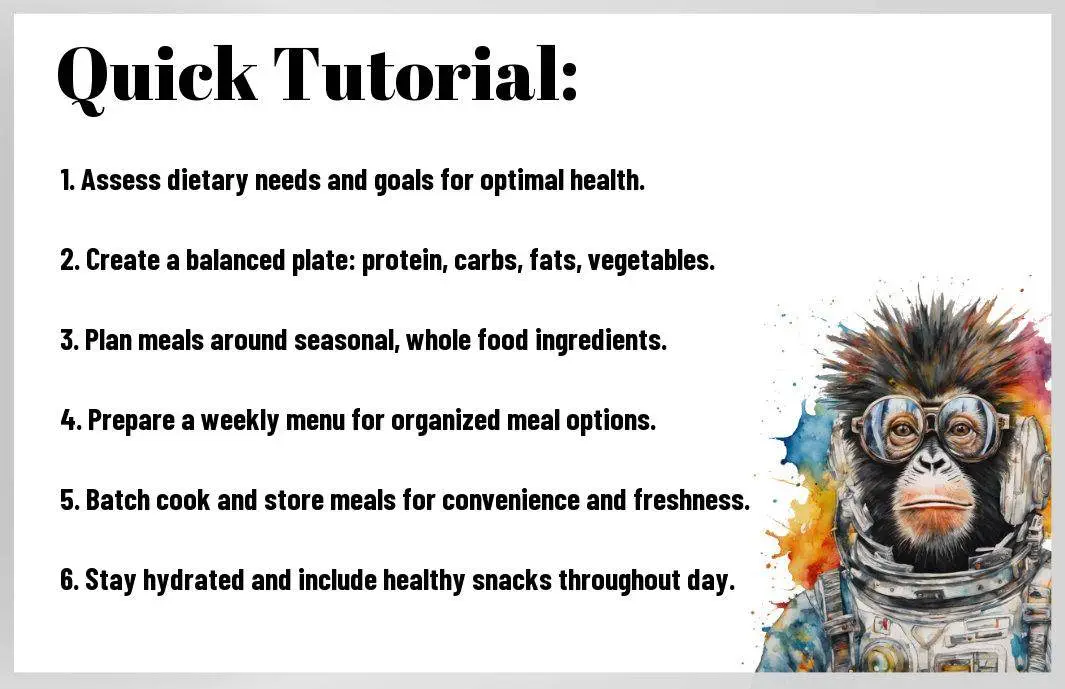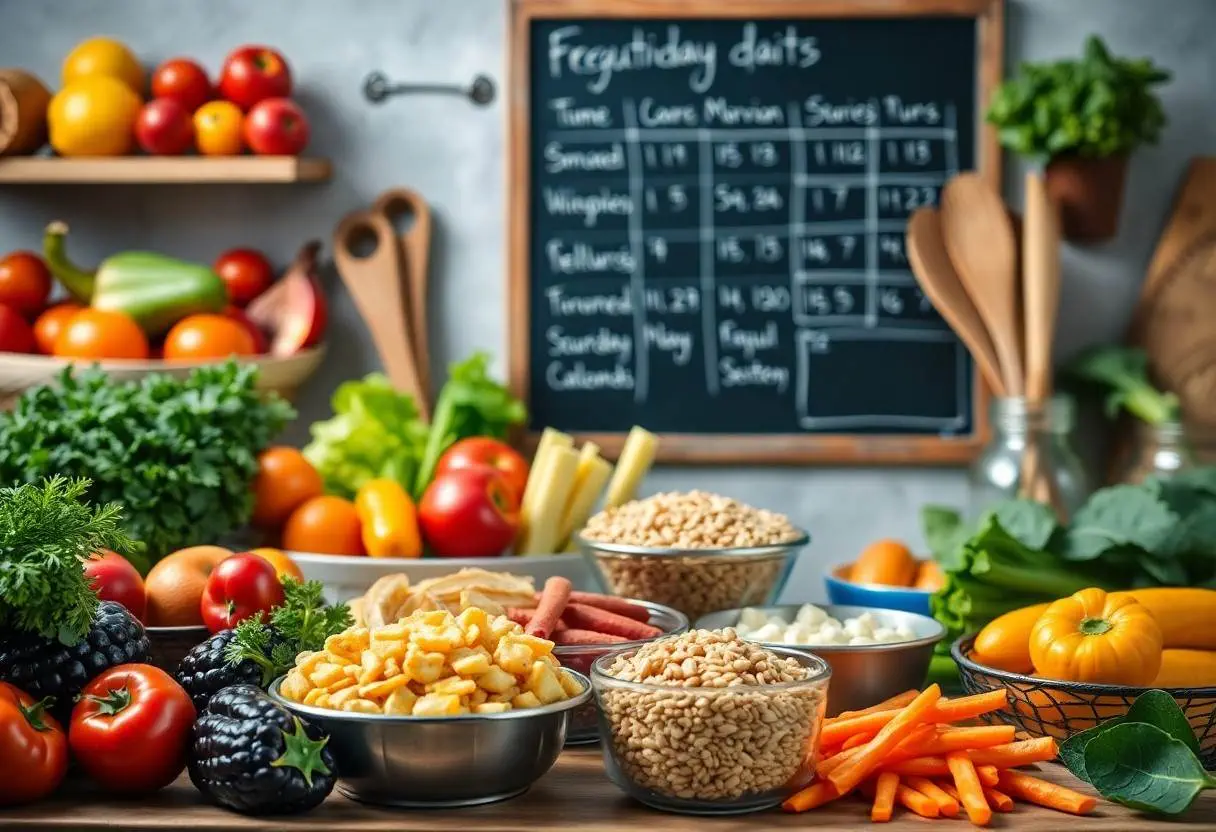What Strategies Can You Use To Plan Meals For Optimal Nutrition And Healthy Diets?
To meticulously craft a diet that enhances your well-being, you must explore a variety of meal planning strategies that prioritize optimal nutrition. Understanding your body’s unique requirements and preferences can transform the way you approach food. By incorporating elements such as balanced macronutrients, seasonal ingredients, and strategic prepping, you can create meals that not only nourish but also invigorate your lifestyle. In this guide, you will uncover practical suggestions to elevate your meal planning and foster a nutritious diet tailored to your personal health goals.
Understanding Nutritional Needs
While planning for optimal nutrition, it is vital to understand your unique nutritional needs based on various factors such as age, gender, activity level, and health conditions. By recognizing these aspects, you can develop a meal plan that effectively supports your individual health goals and enhances your overall well-being.
Macronutrients and Micronutrients
On your journey to a healthy diet, it’s crucial to balance macronutrients—carbohydrates, proteins, and fats—with micronutrients, which include vitamins and minerals. Each nutrient plays a significant role in maintaining your body’s functions, so ensuring you have a well-rounded intake is key to good health.
Individual Dietary Requirements
On top of macronutrients and micronutrients, individual dietary requirements can vary widely from person to person. Factors such as food allergies, chronic conditions, or specific dietary preferences can impact your ideal meal plan.
Another important aspect of individual dietary requirements is recognizing how your body’s needs change over time. For example, athletes may require higher protein intake for muscle repair, while someone managing diabetes might need to monitor carb consumption closely. Tailoring your meal plan to fit these specific needs will promote greater health and vitality.

Meal Planning Strategies
If you want to ensure you’re eating a balanced diet, effective meal planning strategies are vital. Start by allotting a specific time each week to plan your meals, taking into account both nutritional needs and your schedule. Utilize a variety of recipes that include different food groups, and batch cook where possible to save time and effort. This proactive approach promotes healthier eating habits and reduces the likelihood of resorting to convenience foods that might not align with your nutritional goals.
Creating Balanced Meals
If you’re aiming for balanced meals, focus on incorporating a variety of macronutrients. Each meal should ideally include a protein source, whole grains, healthy fats, and plenty of fruits or vegetables. This combination not only supports good health but also keeps you feeling satisfied and energized. Utilize tools like portion control and visual cues to help you create meals that are both nutritious and enjoyable.
Incorporating Seasonal and Local Foods
Any time you can incorporate seasonal and local foods into your meal planning, you’re making an excellent choice for both your health and the environment. These foods are often fresher, tastier, and more nutrient-dense, as they’re harvested at their peak. Additionally, you’re supporting your local economy and reducing the carbon footprint associated with long-distance food transportation.
Foods that are in season typically have a higher nutrient content because they are harvested at their peak ripeness. Shopping at local farmers’ markets or community-supported agriculture (CSA) programs can provide access to these fresh ingredients. Not only does this enhance the flavor of your meals, but it also encourages you to experiment with new recipes, promoting a diverse and healthy diet. Embracing seasonal produce can also help make your meals economical, as seasonal items are often more affordable.
Budget-Friendly Meal Planning
Unlike common perceptions, meal planning can be tailor-made to fit your budget without sacrificing nutrition. By organizing your weekly meals and snacks ahead of time, you can avoid impulsive buying and manage your food expenses effectively. Focusing on seasonal produce, bulk items, and simple recipes allows you to create nutritious dishes while saving your hard-earned money.
Cost-effective Grocery Shopping
An effective grocery shopping strategy begins with creating a shopping list based on your meal plan. This helps you stay focused on importants, reducing the likelihood of impulse purchases. Additionally, consider shopping at local farmers’ markets or discount grocery stores to find fresh produce at lower prices, and always look for sales and promotions on healthy staples.
Meal Prep Techniques
One effective technique for maintaining a budget-friendly meal plan is meal prepping. By dedicating a specific day each week to prepare your meals, you can streamline your cooking process, reduce food waste, and ensure that you have nutritious options ready to go when you need them.
This involves batch-cooking components like grains, proteins, and vegetables to assemble your meals quickly throughout the week. You can store these items in portioned containers, making it easy to grab a healthy lunch or dinner. Additionally, investing in quality storage containers will help keep your food fresh longer, ensuring you maximize your time and resources while adhering to your budget.
Time Management in Meal Preparation
After a busy day, it can be challenging to find time to prepare nutritious meals. Effective time management in meal preparation allows you to streamline your cooking process, making healthy eating more accessible. By allocating specific times for shopping, prepping, and cooking, you can ensure that nutritious meals are part of your daily routine without adding stress to your schedule.
Setting a Weekly Cooking Schedule
Management of your cooking schedule not only enhances your efficiency but also minimizes the temptation to resort to unhealthy convenience foods. Consider designating one day a week for meal prep, where you can cook large batches of grains, proteins, and vegetables. This planning frees up time during the week, allowing you to assemble meals quickly while prioritizing nutrition.
Efficient Cooking Methods
To optimize your meal preparation, adopting efficient cooking methods is imperative. Techniques like batch cooking, steaming, or utilizing slow cookers can save time while preserving nutrients. You can also explore one-pot recipes, allowing you to prepare an entire meal with minimal cleanup. These methods simplify the cooking process, making it easier for you to enjoy healthy meals throughout the week.
Cooking with efficiency in mind can significantly enhance your meal preparation routine. Using the right tools, such as food processors or pressure cookers, can reduce cooking times drastically. Additionally, opting for prep work like chopping vegetables or marinating proteins in advance helps lessen the burden on busier days. By implementing these methods, you facilitate a smoother cooking experience, ensuring that nutritious meals are not complicated or time-consuming.
Adapting Meal Plans for Special Dietary Needs
For individuals with special dietary requirements, adapting meal plans is crucial for maintaining optimal nutrition. This may include incorporating specific food groups or excluding certain ingredients to accommodate allergies, intolerances, or lifestyle choices. By personalizing your meal plans, you can ensure that you meet your nutritional needs while still enjoying a varied and fulfilling diet.
Vegetarian and Vegan Options
Meal planning for vegetarian and vegan diets involves focusing on plant-based foods to provide crucial nutrients. Incorporate a variety of fruits, vegetables, legumes, nuts, seeds, and whole grains to ensure you’re getting adequate protein, iron, and vitamins. By exploring diverse recipes, you can create satisfying meals that align with your dietary preferences.
Gluten-Free and Allergy Considerations
If you have gluten intolerance or specific food allergies, it’s important to carefully select ingredients that do not trigger your sensitivities. Many grains, such as quinoa and rice, can be excellent gluten-free options, while fresh fruits and vegetables are naturally safe choices.
Needs vary when it comes to gluten-free diets and allergy considerations; therefore, take time to read labels and understand food contents. Opt for certified gluten-free products to minimize cross-contamination, and always consult reliable sources for recipes that cater to your specific dietary restrictions. Planning ahead will help you create delicious, safe meals tailored to your individual health needs.
Monitoring Progress and Adjusting Plans
Not monitoring your progress can lead to ineffective meal planning. By routinely evaluating your food intake and health goals, you ensure that your meal strategies align with your nutritional needs. Utilize food diaries, apps, or consult a nutritionist to keep track of your meals and adjust your plans as necessary for optimal results.
Assessing Nutritional Intake
Assuming your current diet is balanced can lead you astray. Regularly assessing your nutritional intake provides insight into any deficiencies or excesses in your diet. By analyzing what you eat, including macro and micronutrients, you can tailor your meal planning to better support your health and wellness goals.
Making Necessary Adjustments
If you notice areas needing improvement, it’s important to make necessary adjustments to your meal plans. Small changes can significantly impact your overall nutrition, making it easier to meet your dietary goals. Whether it’s incorporating more vegetables, reducing processed foods, or adjusting portion sizes, these tweaks help enhance your diet’s effectiveness.
Necessary adjustments should be guided by your ongoing assessments. You might find that certain foods don’t meet your energy needs, or perhaps you have developed new dietary restrictions or preferences. By being flexible and willing to adapt your meal plans, you create a sustainable and enjoyable approach to nutrition that enhances your health long-term.
Final Words
As a reminder, planning meals for optimal nutrition and a healthy diet involves understanding your nutritional needs, setting specific goals, and incorporating a variety of food groups. You should prioritize whole foods, balance macronutrients, and explore meal prepping to minimize last-minute unhealthy choices. Don’t forget to pay attention to portion sizes and hydration. By utilizing these strategies, you can create meal plans that nourish your body and support your overall well-being.
